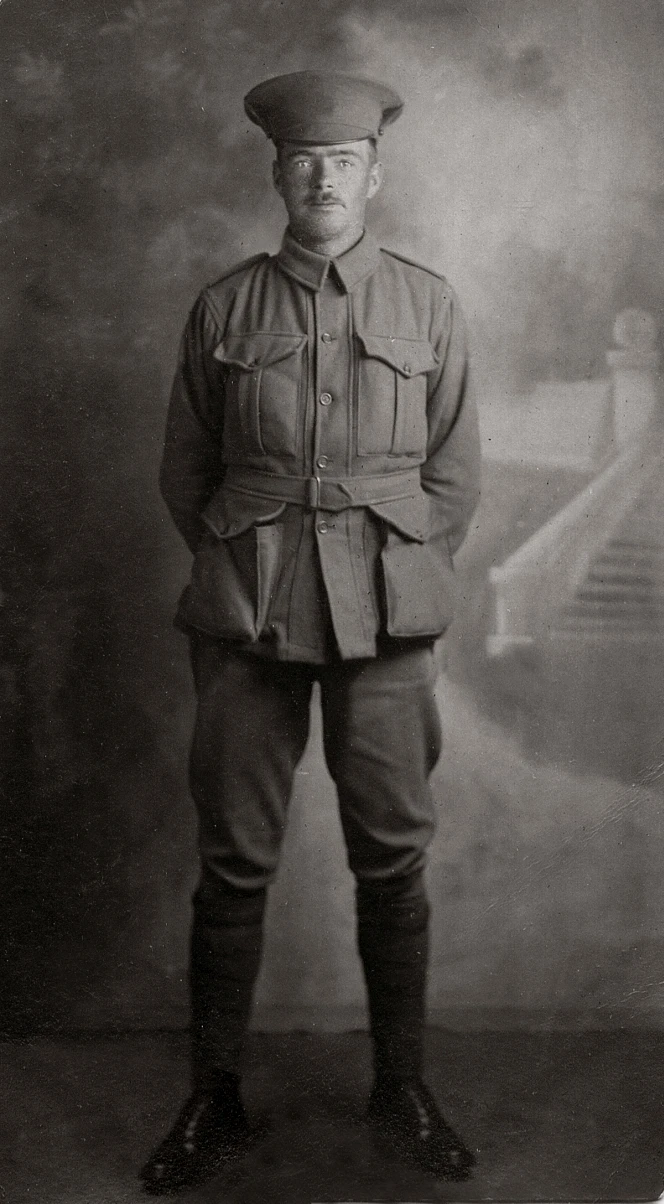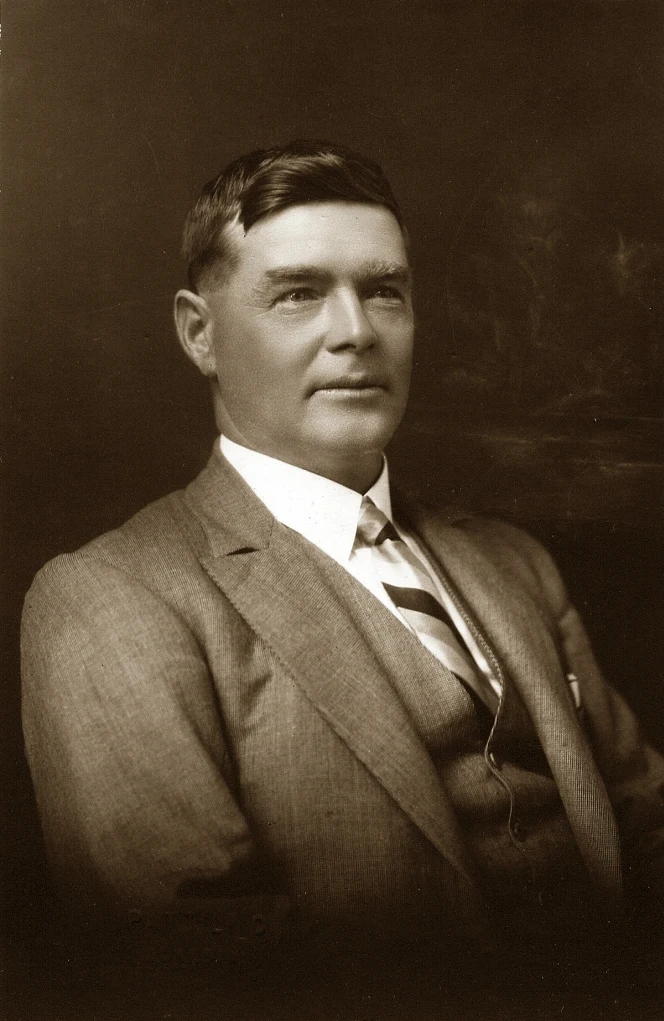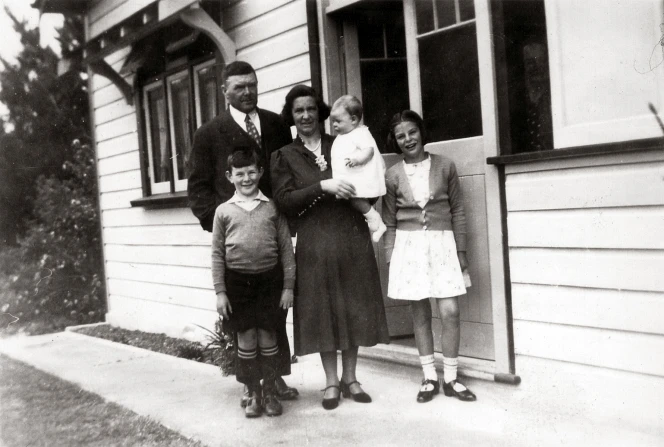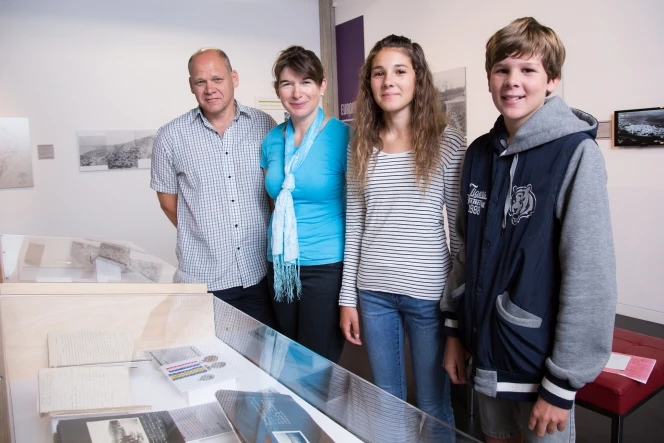‘A Queer Mixture of Men’
John McLeod grew up in rural South Canterbury and attended Timaru Boy’s High School. He studied law in Christchurch, but, on his doctor’s advice, moved to Queensland hoping that the warmer climate would improve the condition of his lungs.

John McLeod in uniform of the Australian Imperial Forces, ca 1915. Photographer unidentified. McLeod family collection
In January 1915, the twenty-eight-year-old McLeod was working as a survey hand when he enlisted with the Australian Imperial Forces. After training at Enoggera military camp and Broadmeadows signalling school, he was assigned to the 4th Regiment of the 9th Battalion. His diary begins with a typically astute observation:
Easter Sunday 1915
Leaving about middle of next week. Many of us, no doubt, not coming back. A queer mixture of men. There is the adventurous element that could not resist the allurement of a fight. There are the men getting on to middle life, mild failures in their own calling, who recognise this as their supreme chance to make good. There are husbands tired of married life; husky young fellows tired of the monotony of home looking forward to the trip; spielers on the make; genteel clerks and the like, who find it very trying to associate with the ‘working class’ but who joined up for shame’s sake; many grey platoons of Australian workers, out of work, in the game because it means a steady job and steady pay. Brown-skinned, clear-eyed, reckless yet shrewd, these will be the back-bone of our army. They find it hard as yet to knuckle down to discipline; but wait and see them in the Real Thing. They are sure to make good.
McLeod landed at Gallipoli on Thursday 27 May and over the following six months he recorded his experience with remarkable perceptiveness and eloquence. At the beginning of the diary McLeod quotes from the first New Testament book of Peter 4:12: ‘Beloved, think it not strange concerning the fiery trial which is to try you’, and he provides many sombre illustrations of the ‘trial’ which he endured with his fellow soldiers:
26.6.15
McGuinness rolled over and over down the hill like a shot rabbit. They carried him away on a stretcher. His head wobbled and blood trickled from his open mouth. Death is not always beautiful...
...Trench life on Walker’s Ridge is awful. Since the gallant charge made by 8th & 9th Light Horse their dead have lain where they fell between the trenches, and the stench is sickening... Incendiary bombs, petrol and lime have been freely used to destroy the bodies and remains of accoutrements, uniforms and rifles can be seen slowly smouldering among positions of dead bodies. Occasionally a clip of cartridges will explode in the fire like a packet of Chinese crackers. Undisturbed bodies after a few weeks seem to sink down into little heaps looking like huddled up bundles of old clothes. These brave chaps never hesitated to clamber over the parapet and face certain death, for it was a forlorn hope, and not a man reached the Turkish trenches. Very few got back, and they were wounded.
McLeod often used poetry to express his feelings:
In Poppy Gully
The Turkish had their armistice
And would grant us one in a trice,
But we’re too proud to ask.
Our mates lie stark, a sad reproach
But guns are near to bar approach.
To weave their shroud is nature’s task.
As fondly as a lover
Rank weeds and flowers cover
The dead that lie unburied
In silent ranks and serried
Out there in Poppy Gully.
In November, suffering from oedema and anaemia, McLeod was given a ‘blue ticket’ and hospitalised. His relief at escaping the ordeals of Gallipoli is clear in this passage:
Fine supper of braised beef. Stretcher cases alongside me, delirious.
For myself, I am thankful to be lying at my ease in a soft cot, to be wearing clean clothes, and enjoying a jolly good rest, with no worries to ‘stand to’; ‘next for duty’, or Abdul’s shrapnel. One ‘sick’ man this morning, when he did not get milk with his porridge, said he wished he were back in the trenches. He will find plenty willing to exchange places and chance the milk.
On leaving Gallipoli, McLeod felt uneasy about leaving his mates behind. The heading at the top of one page of his diary reads: ‘Good night Dardanelles – 25th May – 18th November.’
On the following page he records the observation of a fellow hospital patient: ‘I wonder if the lads in their graves along the Dere will hear us creeping away, deserting them. I hope they are asleep.’ McLeod uses this remark in a coda to his departure:
Below the hill, along the Dere
The boys are soundly sleeping:
O steal away – don’t wake them, pray.
Leave Anzac in their keeping.
John McLeod re-joined his Battalion in January 1916 and saw action in Egypt in defence of the Suez Canal. In June he sailed for France, landing at Marseilles. Following a 62-hour train journey – during which he notes the start of daylight saving – McLeod was in base camp behind the Western Front. In May he was wounded, and after recuperating in England, was classified ‘C1 – for home service’.
To the end McLeod’s diary records his sympathetic observations. When he was being stretchered to a dressing station a friend from his regiment passed by:
Pelvin passed me here carrying his Lewis gun. He waved his hand and called ‘Cheerio’. I never saw him again...
...Hear about Bruce Pelvin’s fate on Sept 3rd… seen lying out in a shell hole, pretty far gone.
The final diary entry reads:
Put on next draft for France. Leaving this week. Am packing this notebook in parcel and posting it home. I wish I could follow it there.
The recently digitised WWI service records of the Australian National Archives reveal that John McLeod re-joined his unit in France in June 1917, after nine months recuperation in England. He had a desk job in Rouen until he was hospitalised with bronchitis in March the following year, and again spent time in England. He saw further service in France in various administrative roles in 1918 and returned to Southampton shortly after the Armistice. He returned to Australia on the Port Melbourne as ‘ship staff’ and received his discharge papers on 22 October 1919.

John McLeod, ca 1930. Photographer unidentified. McLeod family collection
We don’t know when McLeod returned to New Zealand. He was granted land at Enfield, North Otago, as part of the land ballot for returned servicemen. In 1928 he married Isobel Marshall and they had three children: Joy, Calum, and Ken. John McLeod died on 26 November 1942, aged 55.

John and Isobel McLeod with their children Calum, Ken and Joy, ca 1940. Photographer unidentified. McLeod family collection
John McLeod’s diary was donated to the Turnbull Library by his widow Isobel in 1975. It was selected for the Library’s WW100 digitisation project, and is one of the diaries included in our World War One exhibition, A Contemporary Conversation.
The diary is one of more than 300 from World War One held by the Turnbull Library. These provide a distinctly personal and uncensored account of New Zealanders' wartime experience. McLeod’s diary is richly textured and wide ranging in its observations, opinion and factual detail, and provides an invaluable resource for researchers, and family both McLeod’s own, and in one instance, the family of Lieutenant Cecil Oliver.
Wednesday 22nd September, 1915 Lieutenant Cecil Oliver, next of kin, E Oliver of 30 Nelson Street, Petone, NZ. Killed this afternoon at 5pm by sniper’s bullet as he was firing through loophole. Went to his funeral at 9th Bn cemetery same day evening 2030, conducted by padre of 5 Bn AIF.
Borders and crosses of beach pebbles on the graves glistened strangely white in the moonlight.
I wish to thank Sue Allan and Mary-Jane Konings, grand-daughters of John McLeod, for assisting with the research for this article, and for providing these photographs of John and his family.

Wayne and Sue Allan (nee McLeod), with their children Bridget and Jonathan, visiting A Contemporary Conversation in January 2015. They are standing in front of the display case that shows John McLeod’s diary and service medals. Photographer: Mark Beatty
I read the diary and I transcribed it and have placed the transcription online. Thank you, ATL staff, for placing the images online. JD was a good writer, he brings you right there. I just waited for him to be injured so he could get out of that mess. He was Classified C-1 -home service 3rd March 1916 but on 21st March Classified A3. Then he goes back to it and sends this diary home. Where is the next diary?
http://www.rootsweb.ancestry.com/~nzlscant/McLeod_diary_1915.htm
When I'm sent back again to stern Duty and France
And I meet the REAL heroes of this great Advance
My stripe will come down, for I won't have the Pluck
To flaunt in THEIR faces the Badge of Good Luck.
J. McL. 3rd L.G.H. October 1916